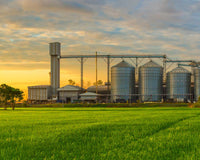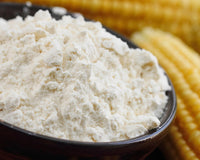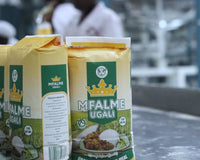Like any other industry, maize milling has its unique processes and terminology. Here’s a simple explanation of how a maize mill works and the processes that can take place during the production of maize meal and bran, depending on the set-up and size of the milling operation, and the type of maize meal required (community, super, special or very fine maize meal).

Storage
The raw, unprocessed maize is stored in bags or silos, depending on the size of the operation. It is of the utmost importance that this step is executed safely as maize that is stored without taking the necessary precautions can cause serious health issues. Read more about the health risks here and about effective maize storage here.

How does a maize mill work?
1. Cleaning / Pre-cleaning of raw maize
The raw maize is fed into the plant where it will first undergo the cleaning stage.
This step improves the quality of the final product. It’s vital that foreign material such as husks, straw and dust is removed using slotted screens or aspiration. As an extra precaution, a magnet is used to remove metal that could damage milling equipment. This process prolongs the lifespan of the mill and milling equipment.
Roff recently introduced a new pre-cleaner to its range, the CLR 107, offering a bigger capacity of 18 tons per hour. As the CLR 107 is manufactured locally, it's more cost effective and has a short lead time.
Cleaning or pre-cleaning is done by hand with a simple table screen at community mills.

2. Conditioning
Conditioning is the addition of water to get the germ and bran moist for optimal removal/separation. Controlled humidity increases the effectiveness of degermination and improves maize meal quality. Conditioning combined with a degerminator gives the best results.
In community mills, this is done by hand or using Roff’s Posho mixer.

3. Degermination (Optional)
This process removes the germ from the endosperm to achieve a more refined maize meal and to prolong the end product’s shelf life. The by-product can be used as an ingredient in animal feed, further adding to profitability.
Some regions do not include the degermination step, but go straight to milling after conditioning, especially when producing special maize meal.
You can read more about the history of degerminators here.

4. Milling and sifting
This step entails a combination of rollers and screens that break the product down to maize meal and removes the remaining bran before packaging.

Fortification (Optional)
The end product can be fortified with vitamins to meet the specific country’s food regulations during this step. The Roff Micro Doser Feeder is ideal for feeding small capacity dry products such as vitamins into maize meal.
Fine milling (Optional)
An additional milling step is included to reduce the granulation (texture) to a very fine flour. The Roff series of Hammer Mills are made to consistently produce the fine grade of flour you require.

Packaging
During the final step, the product is packaged as maize meal. It can either take place manually, or via a semi-automatic or automatic process. Apart from the operational aspects involved in packaging your product you also need to consider how your product packaging looks. We have some handy packaging design tips here.

Find the maize mill perfect for your needs
Roff offers a host of maize mills to cater for your every milling requirement, whether you’re just getting started, or are looking to upgrade your operation. In this section we look at some of the options in the Roff range of turnkey maize mills. Let's start with a small commercial mill, the Roff SP-1 650 kg - 1 ton maize mill.
The Roff SP-1 is an example of a small compact mill, and is perfect for starting your maize milling business.

Roff’s SP-1 mill is everything you need to start milling high-quality maize meal and/or produce stock feed and from arrival at your site, it can take as little as two weeks to set up. We simplified the milling process to its core stages:
Step 1: Cleaning
Step 2: Conditioning
Step 3: Degermination
Step 4: Milling
This makes it possible to produce high-quality maize meal without a massive upfront investment.
Roff offers a range of optional extras that improve capacity and quality and can be added quickly and conveniently as the need arises.
All you need to supply in order to operate your Roff SP-1 maize mill is a building, a water point, a forklift for installation, and electrical installation.
If you are looking to go smaller, it's well worth reading our article on the differences between commercial and community milling. Also have a look at the Roff Posho mill, specifically designed for rural productivity.
Do you need larger capacity?
If you are ready to produce on a larger scale you may want to consider the Roff R-40 maize mill. It's next in line size wise and the newest in the range, producing 2 - 3 tons per hour or 50 - 70 tons per day.

The R-40 is built on proven equipment (MK-6 platform) and boasts Roff's best-in-class extraction rates. It's compact with a footprint of only 15m(L) x 9m(W) x 6.6m(H).
To view the rest of Roff range of turnkey maize mills, you can go here.
At what capacity does maize milling become profitable?
One way we support entrepreneurs is by advising them on how to develop a solid business plan. And part of that is determining how you are going to be profitable. So, we developed a free profit calculator you can use to crunch all the numbers to calculate your success. Try it out. You won’t be sorry you did.
Business plan do’s and don’ts can get very confusing, so we have compiled a hub with useful information, tips and guides to help you write yours
HANDY RESOURCES ON WRITING YOUR BUSINESS PLAN







9 comments
Rudd Runyararo Nyandoro
How much is the smallest commercial maize meal and l m in Zimbabwe. Is there any guarantee as to your machinery.
———
Roff Milling replied:
Hello Rudd, please forward your inquiry to our dedicated sales team at sales@roff.co.za<mailto:sales@roff.co.za> for them to get in touch. Regards
Kenias
How much is a small commercial maize meal production machine
———
Roff Milling replied:
Hello Kenias, our sales team will get in touch soon. Regards
Fredy Dela
Hi,
I would like to set-up a corn milling facility in a small island in Tawi-Tawi Province, Philippines.
Do you have a representative in the Philippines?
Hope to receive your reply.
Thanks.
———
Roff Milling replied:
Good Day, our sales team will get in touch soon.
Owen PETER NKHONYO
How much is the whole setup, am in Malawi. Do you offer it on a loan ? I really need this machine
———
Roff Milling replied:
Hello Owen, our sales team will get in touch soon.
Ahmed Hassan Baba
We want to start maize processing business here in Nigeria, but we lack experience. How many kg can produced 50kg of maize flour?And what type of your machine can we used?
———
Roff Milling replied:
Hello Ahmed, our sales team will get in touch. Regards
———
Roff Milling replied:
Good Day, please have a look in your e-mail inbox, our sales team has been in touch. Regards
Cyrus
20tons per day machine is how much
———
Roff Milling replied:
Hello, our sales team will get in touch shortly to assist.
Thabani
I want to start a business to sell maize meal hence I want to purchase the smallest processing plant.
Nima Nima
I want to start up the maize milling process in Bhutan. How do I start? I need experts to help me
———
Roff Milling replied:
Hello Nima, one of our consultants will get in touch shortly.
Sam Mkhabela
Maize mill process
———
Roff Milling replied:
Hello Sam, thank you for your message. Please send us a mail to sales@roff.co.za<mailto:sales@roff.co.za> with all your questions, and our skilled consultants will get in touch. Kind Regards